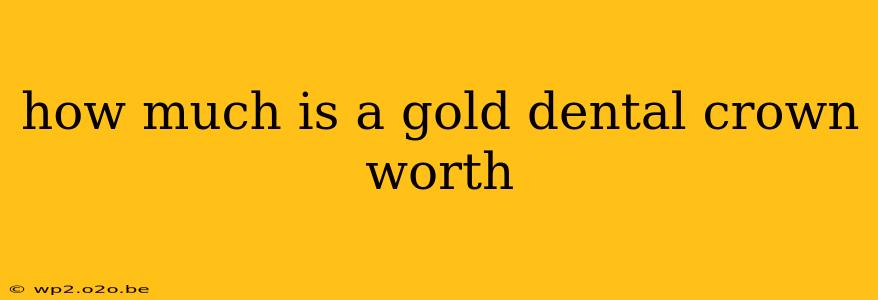Gold dental crowns, once a common sight, represent a fascinating intersection of dentistry and precious metals. Their value fluctuates based on several factors, making a definitive answer to "How much is a gold dental crown worth?" more complex than a simple price tag. This comprehensive guide will break down the various elements influencing the value of a gold crown, helping you understand its worth from both a dental and a precious metal perspective.
Factors Affecting the Value of a Gold Dental Crown
Several key factors contribute to the final worth of a gold dental crown:
1. Karat of Gold: Purity Matters
The karat (K) of the gold significantly impacts its value. Higher karat gold (e.g., 22K or 24K) signifies a higher percentage of pure gold and thus commands a higher price. Dental gold alloys typically range from 10K to 22K, with 22K being the most common for crowns due to its strength and durability. Lower karat gold alloys often include other metals like palladium or platinum to increase strength and reduce cost. Understanding the karat is crucial in determining the crown's gold content and its associated value.
2. Weight of the Gold Crown: Size and Material
The weight of the gold crown directly correlates with its value. Larger crowns, needed for larger teeth, will naturally contain more gold and therefore be worth more. The specific alloy used also impacts the weight. A crown made from a denser alloy will weigh more than one made from a less dense alloy, even if both contain the same karat of gold.
3. Current Gold Prices: A Fluctuating Market
Gold prices are dynamic, influenced by global economic conditions, currency fluctuations, and market speculation. Checking the current spot gold price (the price per troy ounce of pure gold) provides a benchmark, but remember that the actual value of your gold crown will be slightly less due to the alloying metals present. Reputable sources for tracking gold prices include financial news websites and precious metals dealers.
4. Condition of the Crown: Damage Impacts Value
The condition of the crown plays a significant role. A damaged or severely worn crown will fetch a lower price than one in excellent condition. Significant scratches, bends, or fractures will affect the refiners' ability to extract and refine the gold, impacting the final payout.
5. Refiner's Fees: The Cost of Extraction
After you sell your gold crown, a refiner processes it to extract the pure gold. Their fees vary depending on the refiner, the complexity of separating the gold from other alloys, and the processing methods employed. These fees directly deduct from the final amount you receive.
Determining the Value: Practical Steps
Unfortunately, you can't simply weigh the crown and multiply by the current gold price. Here's a practical approach:
-
Identify the Karat: While not always easy, examine the crown for any markings indicating the karat.
-
Weigh the Crown: Use a precision scale to determine the weight (ideally in troy ounces).
-
Research Current Gold Prices: Consult reliable sources for the current spot price of gold for the relevant karat.
-
Contact Precious Metal Refiners: Several refiners specialize in dental gold. They'll provide quotes based on the information you provide (karat, weight, condition). Directly contacting several will ensure you get the best offer.
-
Consider the Refining Fees: Remember to factor in the refiner's fees before accepting an offer.
Beyond Monetary Value: The Dental Perspective
It's important to remember that a gold crown's primary value is its dental function. It's a restoration designed to protect and strengthen a damaged tooth. While its gold content holds monetary value, removing a functional crown solely for its precious metal content should only be considered after consulting with a dentist. A damaged crown may need replacement for dental health reasons before you can consider its financial worth.
Conclusion
The value of a gold dental crown is a multifaceted issue, determined by several factors that intertwine to influence its monetary worth. While you can't ascertain the precise value without professional assessment, understanding the factors above empowers you to make informed decisions. Remember to prioritize your dental health and always consult with your dentist before removing any dental restorations.

